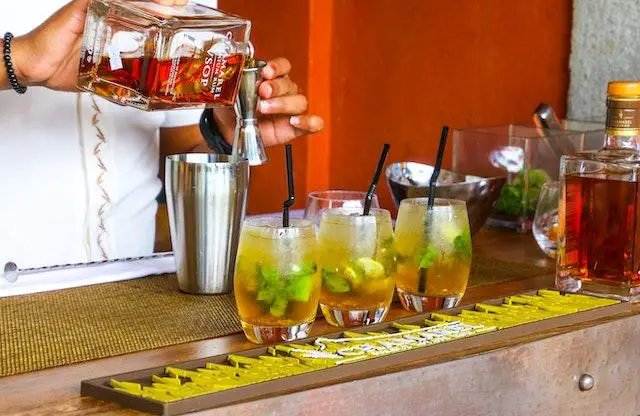
Alcohol is a substance that can have a variety of effects on the body, from making you feel relaxed and happy to impairing your motor functions and causing dizziness.
One of the most well-known effects of alcohol consumption is its ability to make you feel drunk.
So, why does alcohol make you drunk?
Why do we get drunk from alcohol?

There are a number of factors that can contribute to why alcohol makes you feel drunk. These include:
The way that alcohol is metabolized by the body.
Alcohol is metabolized in the body in a number of different ways.
One important factor is that alcohol interferes with the normal production and absorption of neurotransmitters, which are chemicals that help to regulate various functions in the body, including emotions and motor control.
Changes in neurotransmitter activity and balance in the brain.
One major contributor to why alcohol makes you drunk is the changes that it can cause in the neurotransmitter activity and balance in the brain.
These changes involve disrupting the normal functioning of neurotransmitters, which are chemicals that play an important role in regulating various functions in the body, including mood and motor control.
Alcohol interferes with the production and absorption of these neurotransmitters, leading to changes in their activity and balance in the brain.
This can result in several effects, such as impaired motor function, reduced coordination, and feelings of dizziness or disorientation.
Effects on hydration levels, blood sugar levels, and hormone levels in the body.
Alcohol can cause a variety of effects on hydration levels, blood sugar levels, and hormone levels in the body.
Some of these effects include dehydration, fluctuations in blood sugar and insulin levels, and disruption of normal hormone balance in the body.
These changes are believed to contribute to the feelings of dizziness, disorientation, and impaired motor function often associated with alcohol consumption.
Individual factors.
There are a number of individual factors that can impact why alcohol makes you drunk.
These include factors such as your metabolism rate, genetic susceptibility, and the amount of alcohol consumed at one time.
Factors like these can influence how quickly or slowly your body metabolizes alcohol, altering neurotransmitter levels and resulting in various effects such as impaired motor function, dizziness, and disorientation.
Other environmental or lifestyle factors.
Other environmental or lifestyle factors can also play a role in why alcohol makes you drunk.
These may include stress levels, food intake, and sleep habits.
For example, high levels of stress can alter neurotransmitter activity and disrupt hormone balance in the body, which may contribute to feelings of dizziness or disorientation after consuming alcohol.
The influence of social factors.
The influence of social factors, including cultural attitudes towards drinking and expectations about how alcohol will affect you, can have a significant impact on why alcohol makes you drunk.
These factors may include things like societal norms around alcohol consumption, beliefs about the effects of alcohol on the body, and personal experiences with drinking.
How long does being drunk last?

There is no definitive answer to this question, as the effects of alcohol can vary depending on a number of different factors, including:
- Individual factors such as genetics and metabolism rate
- Environmental or lifestyle factors like stress levels and sleep habits
- Social factors like cultural attitudes towards drinking.
Some people may experience feelings of being drunk for only a few hours after consuming alcohol, while others may experience these effects for much longer.
Ultimately, the duration of being drunk is largely dependent on the factors that influence how alcohol affects your body and mind.
How to sober up fast?

There are a number of strategies that you can use to sober up fast after drinking alcohol. These may include:
Increasing your hydration levels
One of the best ways to sober up after drinking alcohol is to increase your hydration levels.
This can be done by drinking plenty of water, as well as other hydrating beverages such as coconut water or sports drinks.
Drinking adequate amounts of water may help flush out some of the alcohol from your system, reducing its effects on your body and mind.
Consuming foods or supplements
There are a number of foods and supplements that may help to mitigate the effects of alcohol in the body.
These include things like:
- Caffeine, which can help to increase alertness and decrease feelings of fatigue
- B-vitamins, which may help to support normal energy metabolism
- Milk thistle, an herbal supplement known for its ability to protect liver function.
By consuming these foods and supplements, you may be able to reduce some of the negative effects of alcohol on your body, making you feel more alert and clear-headed after drinking.
Getting enough rest
Another effective strategy for sobering up fast after drinking is to get enough rest.
This may include getting an adequate amount of sleep each night, as well as taking short naps or breaks throughout the day if needed.
Getting enough rest can help you recover more quickly from the effects of alcohol in your body, allowing you to feel more alert and clear-headed sooner.
Engaging in physical activity
Additionally, engaging in physical activity such as exercise or light movement can also help to increase your energy levels and promote faster recovery.
Overall, there are many different ways that you can take steps to sober up after drinking alcohol, so it is important to experiment with different strategies until you find what works best for you.
Final thought
There are many different factors that can influence why alcohol makes you drunk, including individual, environmental, and social factors.
Whether you are looking to sober up fast after drinking alcohol or want to better understand how you respond to it in your body and mind, there are many steps that you can take to optimize your recovery process.
By staying well-hydrated, consuming nutrient-rich foods and supplements, getting enough rest, and engaging in physical activity, you can help to mitigate some of the negative effects of alcohol on your body and mind.
Additionally, it is important to remember that everyone’s experience with alcohol will be different, so it is important to listen to your own body and experiment with different strategies to find what works best for you.



